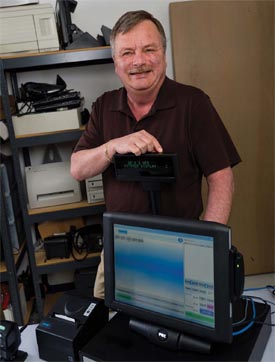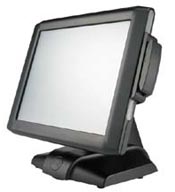Tear Up Your Contracts & Sell Mobile POS
By Matt Pillar, Business Solutions magazine
This retail software developer capitalizes on nontraditional approaches to contracts, payments, loyalty, and — get this — it’s even excited about smartphone applications.

Deutsch Software Development (DSD) isn’t your typical POS VAR, but then, not much that hails from Gig Harbor, WA, is typical of anything. Germanborn founder and CEO Michael Von Ditter is quick to point out that DSD isn’t a VAR so much as it’s a software developer that just so happens to resell the hardware that runs the applications it builds. With a deep stable of tenured and talented programmers, what it builds is seemingly limited only by the imagination of its customers. This is a company that’s developed full-featured POS applications (Encore POS and MuveeTix online ticketing) that are widely-deployed in the hospitality and live entertainment niches. It’s a company that’s tackled payment processing head-on — including PCI DSS and EMV standards — and now reaps the rewards associated with embracing opportunities that many of its peers fear. It’s a company that’s developed a loyalty application that requires no cards or fobs, and a company that’s not afraid to develop mobile POS applications for Android devices. In short, DSD is a company that can teach the channel a few things about finding success with progressive applications that delight customers. The company gives great pause before saying no to anything.
Payments: The Culmination Of The Retail Experience
Regardless of the segment you serve, the payment is the point of the retail experience where all of the players get what they want. The customer gets her product, the merchant gets its payment, the banks and processors get their percentages, and increasingly, the payment application integrator gets a cut of the action. DSD, fueled purely by frustration at the leading solutions at the time, developed a payment processing software (Carpé Charge) for its retail clients more than 15 years ago. The company now happily sells the solution to other integrators and VARs, and husband-and-wife team Michael (CEO) and Christie (COO) Von Ditter aren’t shy about sharing DSD’s payment processing successes. “We have anywhere from 3,000 to 5,000 sites running Carpé Charge, and our partnership with First Data could drive that into the tens of thousands,” says Michael. First Data transaction and swipe fees are typically under 2%, a solid six points or more below average, which keeps DSD customers happy. DSD receives a healthy percentage of the processor’s net margin per transaction. When one considers the volume of the card payments business (some of DSD’s customers conduct millions of card transactions per month), it’s not hard to see the incredible — and scalable — recurring revenue stream payment processing software creates.
Despite this opportunity, many VARs see cost and complexity as barriers to tapping into the payments game. The Von Ditters admit that dealing with PCI requirements is expensive and time consuming, but they also say that much of the trepidation created by PCI compliance is manufactured by misinformation. “The idea that MSRs have to be encrypted is nonsense — a myth that was manufactured to sell hardware. The same goes for POS software — the payment application is in scope, but the POS software certainly isn’t,” says Michael. He’s also quick to point out that Carpé Charge is already compliant and supported, can typically be built into most applications in 5 to 50 lines of code, and, if processed through First Data, the API is made available to integrators free of charge. Once up and running, he says, a VAR can expect 10% of its ISO’s net margin on customer card transactions.
Loyalty Without The Card
Another unique DSD development is a loyalty program that’s baked into Carpé Charge and linked to one or more of the consumer’s credit cards, eliminating the need for a separate card or key fob. This reduces the retailer’s hard costs, and the approach seeds business for the integrator by creating a pool of merchants who can cross-reference promotions to cardholders on a single system. Christie uses her hometown as an example. “Gig Harbor is a relatively small town with hundreds of small businesses. Using our loyalty program, fine restaurants can offer specific patrons discounts on local bed and breakfasts, for instance.” And as Michael explains, it’s better for his business to have thousands of small customers than one hundred big ones, so programs like this create a community rallying point. Consumers enjoy the fact that they can link as many cards as they wish to a single account, which drives the appeal of the DSD solution. “The loyalty program can be offered as a measure of goodwill for payment processing customers, or it can become a revenue stream of its own,” says Michael.
Saying Yes To Smartphones And Mobile Apps
The DSD payment and loyalty application is newly available for mobile devices, and the team there can barely contain its collective excitement about the full-fledged POS application that it’s developing for the Android OS. This may shock the good percentage of the VAR community that’s taking a perilous head-in-the-sand approach to the integration of key retail apps and smart devices. But, with EMV (EuroPay, MasterCard, and Visa) program experience under its belt through engagements in France and Belgium, DSD is poised to capitalize on the sure migration to mobile that will come on the heels of the EMV exercise of 2013 and beyond. “We’re ready for EMV in the U.S., and when the time comes it will be nothing more for our customers than a seamless software update, and perhaps a tweak at the card reader,” says Michael.
Its first foray into big mobile applications — due out this year — is a full-blown, tablet-based restaurant system that facilitates the entire dining experience and transaction from the perspectives of both server and patron. The tablet is the menu, the order-entry point, the bill, and the payment vehicle. “The day will come when you can’t take a payment card away from a customer,” says Michael. “Our solution will not only solve that problem, it will improve the patron interaction and it will reduce the establishment’s technology and printing costs.”
Rip Up Your Contracts And Serve Your Customers
The Von Ditters clearly advise VARs to get into payment processing and go mobile. They also advise you to forget about contracts. “We don’t have any contracts that go beyond 12 months,” says Christie. While VP of Business Development Mindy Cushing says this approach relieves pressure on clients during the initial sale, she also says it creates pressure on DSD to develop and sell great products. “With no contract holding our customers to doing business with us next year, we have to continually get better to bring them back,” she says. As it continues to develop retail software solutions with a “yeah, we can do that” attitude, there’s not much room to question whether DSD will keep getting better.

